Looking to pursue a career in audio engineering? Finding the best audio engineering courses and universities is crucial for aspiring audio engineers. Accredited programs at top-ranked universities provide comprehensive training and resources to help students succeed in their careers. Whether you’re interested in music production, film sound design, or live sound reinforcement, choosing the right audio engineering school is essential.
In this article, we will explore the top audio engineering programs and accredited audio production schools in the United States. From curriculum and faculty to facilities and reputation, we will provide you with the information you need to make an informed decision about your education and future career in audio engineering.
But first, let’s understand what a sound engineer does and the opportunities that come with this profession.
Key Takeaways:
- Choosing the right audio engineering school is crucial for future success in the industry.
- Accredited programs at top-ranked universities provide comprehensive training and resources.
- Sound engineering offers opportunities in music production, film, television, gaming, and live events.
- Sound engineers specialize in areas such as live sound reinforcement, sound and music production, and game audio.
- Attending audio engineering school offers benefits such as industry-standard facilities and networking opportunities.
What Does A Sound Engineer Do?
A sound engineer, also known as an audio engineer, plays a critical role in capturing, manipulating, and reproducing sound in various settings. Sound engineers are responsible for ensuring optimal audio quality during live performances, recording sessions, and post-production for films and other media. They collaborate closely with musicians, producers, and directors to understand the artistic vision and technical requirements of a project, using their expertise to adjust levels, effects, and spatial positioning to achieve the desired sonic outcome.
In the realm of live performances, sound engineers operate and maintain audio equipment to deliver exceptional sound quality to the audience. They work with mixing consoles, amplifiers, microphones, and other tools to ensure clarity, balance, and proper distribution of sound in different venues.
Also Read: Importance Of Music In A Student’s Life
During recording sessions, sound engineers utilize their technical skills to capture the best possible audio. They choose and position microphones, set levels, apply effects, and perform editing and mixing to achieve the desired sound quality.
In the realm of post-production, sound engineers work on films, television shows, and other media projects. They manipulate audio tracks to enhance the overall sound, synchronize sound effects, dialogue, and music, and ensure that all audio elements blend seamlessly to create an immersive and captivating experience for the audience.
Overall, sound engineers are key players in the audio production process, using their technical expertise and creativity to shape the sonic elements that bring music, films, and other media to life.
Also Read: 10 Must-Hit Milestones In Your Music Career Journey
Is an audio engineer a good career?
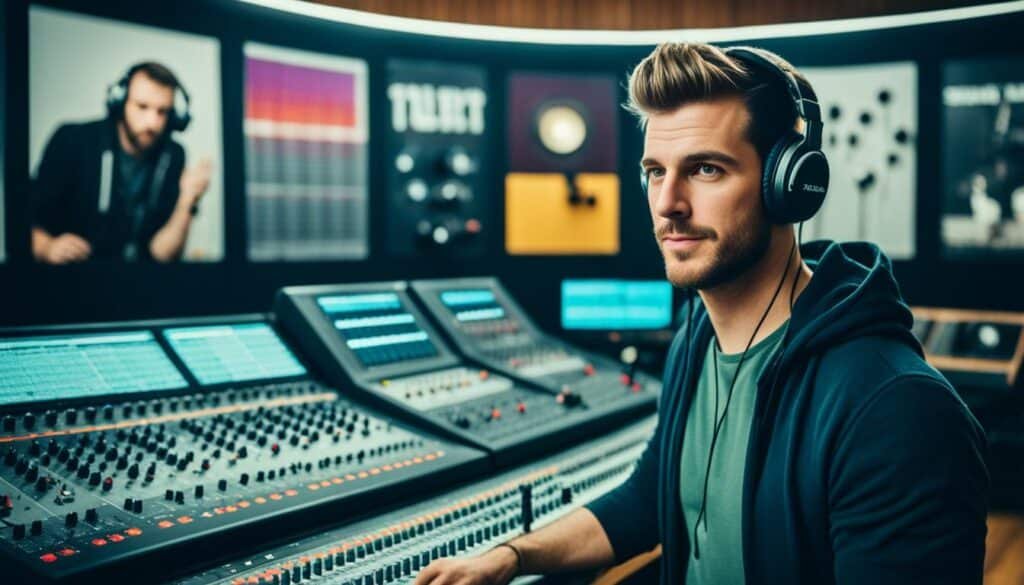
Whether or not a career as an audio engineer is considered “good” depends on individual preferences, interests, and career goals. Audio engineering offers opportunities to work in a number of exciting industries such as music production, film, television, gaming, and live events. However, success in audio engineering often requires a combination of skill development, networking, and perseverance. The industry can be competitive, and income can vary based on factors like experience and specialization. Individuals with a strong technical aptitude, creativity, and a love for working with audio technology may find a career as an audio engineer to be personally and professionally satisfying.
“Audio engineering offers opportunities to work in a number of exciting industries such as music production, film, television, gaming, and live events.”
Audio engineering is a field that attracts individuals with a passion for sound and technology. For those who appreciate the art and science of audio, pursuing a career in this field can be highly rewarding. It offers a unique blend of technical expertise and creative expression, allowing professionals to shape the sonic landscape of various mediums.
While the path to success as an audio engineer may require dedication and persistence, it can lead to fulfilling and lucrative opportunities. With the right mix of education, practical experience, and a strong network, audio engineers can build a thriving career in the industry.
Also Read: Exploring The Boundaries Of Music Copyright
Key Considerations for a Career in Audio Engineering
- Technical Aptitude: A solid foundation in technical skills and knowledge is crucial for audio engineers. Understanding audio principles, signal processing, and working with industry-standard equipment and software is essential.
- Creativity: Audio engineering involves artistic expression and the ability to bring a vision to life through sound. Creative problem-solving and a keen ear for detail are highly valued skills in the field.
- Networking: Building connections within the industry can open doors to new opportunities and collaborations. Attending industry events, joining professional organizations, and participating in internships or assistant positions can help expand professional networks.
- Specialization: Developing expertise in a specific area of audio engineering, such as sound design, live sound reinforcement, or music production, can lead to niche opportunities and differentiation in the job market.
While the audio engineering industry can be competitive, it is a field that continuously evolves and presents new challenges and opportunities. With a passion for audio and a commitment to ongoing learning and growth, a career as an audio engineer can be a gratifying pursuit.
Also Read: Exploring The Premier Music Colleges For Career Advancement
Where Do Sound Engineers Work?
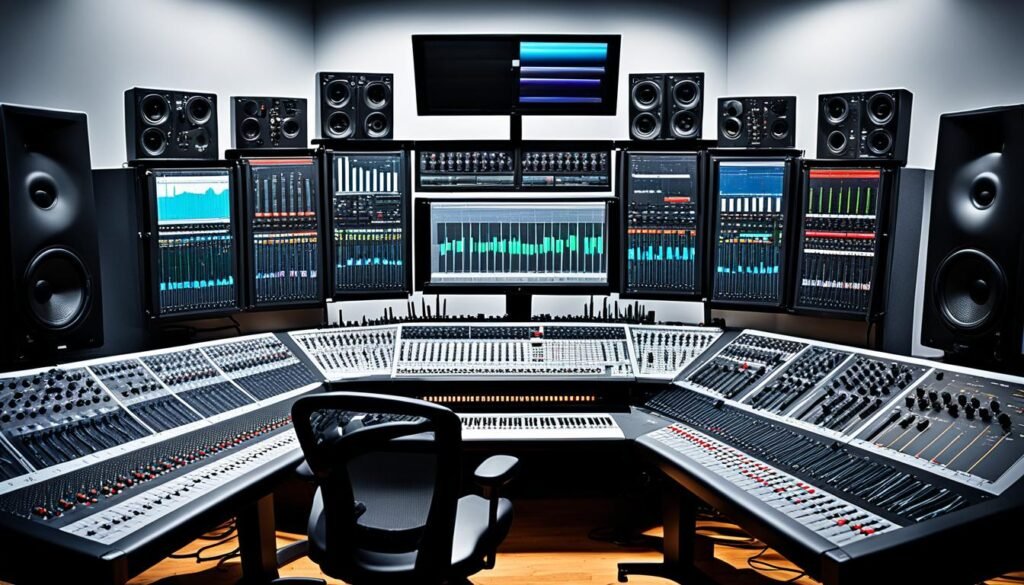
Sound engineers have the opportunity to work in various settings, each offering unique challenges and creative opportunities. Here are some of the common work environments for sound engineers:
- Recording studios: Sound engineers play a crucial role in creating high-quality recordings. They work closely with musicians, producers, and artists to capture and produce the perfect sound.
- Live concert venues: Sound engineers are responsible for ensuring optimal sound quality during live performances. They work with advanced audio equipment to deliver an immersive and balanced experience for the audience.
- Radio and television stations: Sound engineers work in broadcast environments to ensure clear and seamless sound transmission. They fine-tune audio levels and monitor audio quality during live broadcasts.
- Film production studios: Sound engineers collaborate with directors and film crews to capture high-quality audio for movies and TV shows. They use specialized equipment and techniques to record dialogues and sound effects.
- Post-production facilities: Sound engineers play a critical role in the post-production process. They edit and mix audio tracks, ensuring proper synchronization with visuals.
- Arenas, theaters, and corporate events: Sound engineers are in demand for large-scale events where audio reinforcement is essential. They design and set up sound systems to deliver optimal sound quality and coverage.
- Freelancing: Many sound engineers choose to work as freelancers, offering their services on a project-by-project basis. This gives them the flexibility to work across various industries and events, such as weddings, conferences, and music festivals.
Sound engineering skills are highly versatile, and sound engineers can find opportunities in music, film, television, theater, broadcasting, and many other industries. The ability to work in different creative and technical contexts makes the career path of a sound engineer dynamic and exciting.
In addition to these traditional work settings, sound engineers can also explore emerging fields like virtual reality (VR) and augmented reality (AR) experiences, where immersive audio is crucial to creating realistic and immersive environments.
Also Read: Insider Tips On Music University Scholarships For International Students
What qualifications do you need to be a sound engineer?

Becoming a sound engineer requires a combination of education, technical skills, and practical experience. Many sound engineers hold a degree in audio engineering or a related field to gain a strong foundation in the principles and techniques of sound engineering.
A formal education in audio engineering provides students with essential knowledge in areas such as:
- Audio principles
- Acoustics
- Signal processing
- Industry-standard equipment and software
Technical proficiency in audio equipment, recording techniques, and mixing consoles is crucial for sound engineers. They must be able to operate and troubleshoot various audio technologies effectively.
Practical experience is also highly valued in the industry. Internships, assistant positions, or entry-level roles provide aspiring sound engineers with hands-on experience and valuable networking opportunities.
“Sound engineering is a dynamic field that requires a unique combination of technical expertise and artistic sensibility.”
By combining a relevant degree program, practical experience, and ongoing professional development, aspiring sound engineers can build a successful career in audio engineering.
What Areas Can Sound Engineers Specialize In?

Sound engineers have the opportunity to specialize in various areas of audio engineering, allowing them to focus on their specific interests and career goals. Here are a few examples of the different specialties within the field:
- Live Sound Reinforcement: Some sound engineers choose to specialize in live sound reinforcement. They work in concert venues and event spaces, ensuring that the audio during live performances is clear, balanced, and of high quality. These professionals excel at operating sound systems and mixing boards to create an optimal auditory experience for audiences.
- Sound and Music Production: Sound and music production is another popular area of specialization. Sound engineers in this field work in recording studios or post-production facilities, capturing and enhancing audio elements for music, film, and television productions. They have expertise in recording techniques, editing, mixing, and mastering, allowing them to shape the sound to meet the artistic vision of the project.
- Game Audio: With the rise of the gaming industry, sound engineers can also specialize in game audio. These professionals collaborate with game developers to create immersive soundscapes for video games. They design and implement sound effects, music, and dialogue to enhance the gaming experience, making it more engaging and realistic for players.
These are just a few examples of the areas in which sound engineers can specialize. Each specialization offers unique opportunities and challenges, allowing professionals to carve a niche for themselves in the audio engineering industry.
Are sound engineers in high demand?
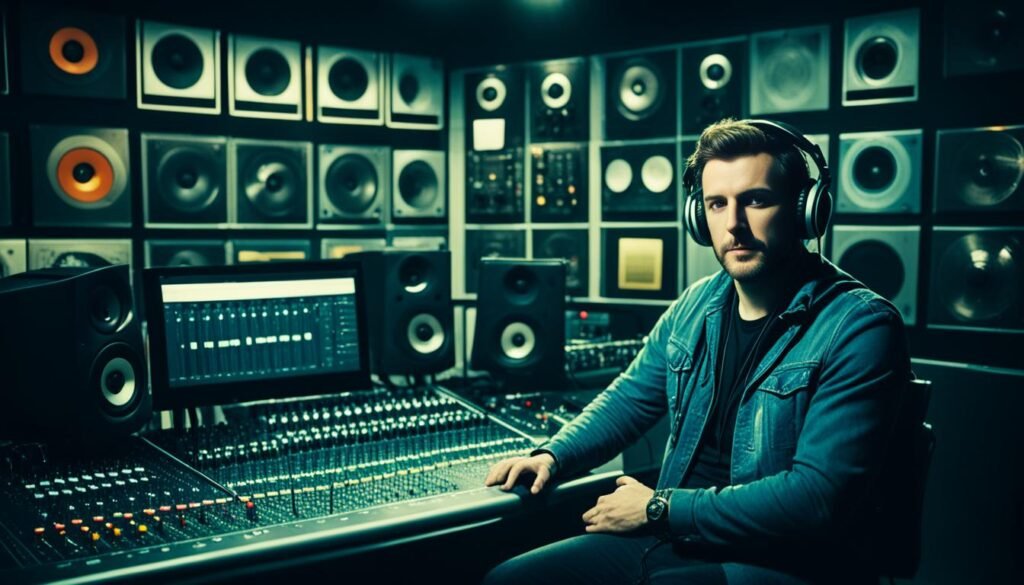
Aspiring audio engineers considering a career in audio engineering will be glad to know that there is currently a high demand for sound engineers. The music production, film, television, gaming, and live events industries are all experiencing growth, creating numerous job opportunities in the field.
Advancements in audio technology, such as virtual reality and immersive audio experiences, contribute to the increased demand for skilled sound engineers. These industries require professionals who can manipulate sound to create captivating and realistic experiences for audiences.
By pursuing a career in audio engineering, individuals can enter a dynamic and evolving industry that offers promising prospects for personal and professional growth.
Projected Growth in Employment Opportunities
The audio engineering industry is poised for future growth, allowing sound engineers to leverage their skills and expertise in exciting and rewarding ways. The Bureau of Labor Statistics predicts steady growth in sound engineering technician jobs in the coming years.
“The employment of sound engineering technicians is projected to grow X% from 20XX to 20XX, faster than the average for all occupations.”
Increasing Job Opportunities in Various Industries
Sound engineers have the opportunity to work in a wide range of industries, including:
- Music production
- Film and television
- Gaming
- Live events
As these industries continue to expand and innovate, the demand for skilled sound engineers will remain high. Whether it’s capturing and mixing audio for a hit song, creating immersive soundscapes for a blockbuster film, or providing impeccable sound reinforcement at a live concert, the possibilities for sound engineers are vast.
Joining an In-Demand Profession
Choosing a career in audio engineering means becoming part of a profession that is in high demand. Skilled sound engineers are sought after by industry professionals looking to deliver top-quality audio experiences to their audiences.
“The ability to master audio technology and technical expertise in sound manipulation is highly valued in the industry, making sound engineers an indispensable asset to any production.”
By acquiring the necessary education, training, and experience, individuals can position themselves for success in this flourishing field.
What do you study for sound engineering?

Sound engineering programs provide students with a comprehensive education that combines classroom learning with hands-on studio experience. The curriculum is carefully designed to equip students with the necessary knowledge and skills to excel in the field of audio engineering.
Introductory Courses in Audiology
Students typically begin their sound engineering journey with introductory courses in audiology. These courses delve into the physiological and psychological aspects of sound, allowing students to understand how sound is perceived and processed by the human auditory system.
Specialized Courses in Audio Engineering
As students progress through their audio engineering degree programs, they dive deeper into specialized courses that focus on various aspects of the field. These courses cover topics such as:
- Recording Techniques: Students learn the fundamentals of recording, including microphone placement, signal flow, and studio acoustics.
- Mixing and Mastering: Students explore the art of mixing and mastering audio tracks, honing their skills in balancing levels, applying effects, and achieving a cohesive sound.
- Digital Audio Workstations (DAWs): Students gain proficiency in industry-standard software used for audio editing, mixing, and post-production, such as Pro Tools, Logic Pro, and Ableton Live.
Practical Experience
In addition to theoretical knowledge, practical experience is an essential component of sound engineering education. Students have the opportunity to work in recording studios, live sound venues, and post-production facilities, gaining hands-on experience in a professional setting. This practical training allows them to apply their skills, work with industry-standard equipment, and understand the real-life challenges and nuances of audio engineering.
Choosing the Right Audio Engineering School
When it comes to pursuing a career in audio engineering, choosing the right school is a crucial step. Your education will lay the foundation for your future in the industry, so it’s important to consider several factors before making a decision.
- Curriculum: Thoroughly research the program’s curriculum to ensure it covers all the essential aspects of audio engineering. Look for courses that encompass both theoretical knowledge and practical skills.
- Faculty: The expertise and experience of the faculty members can greatly impact your learning experience. Look for instructors who have industry experience and a passion for teaching.
- Facilities: Audio engineering requires hands-on practice with industry-standard equipment and software. Check if the school has state-of-the-art facilities and studios that simulate real-world recording environments.
- Location: Consider the school’s location, as it can provide unique opportunities based on the local music and entertainment industry. Schools located in industry hubs may offer more networking opportunities and potential internships.
- Cost: Evaluate the cost of the program and consider your financial situation. Look into available scholarships, grants, or financial aid options to make an informed decision.
Don’t forget to research the reputation of the school within the industry and among alumni. Connecting with current students or graduates can provide valuable insights into the quality of education and job prospects. Ultimately, selecting the right audio engineering school will set you on the path to success in the exciting and dynamic world of engineering and music production.
Top Audio Engineering Schools in the US
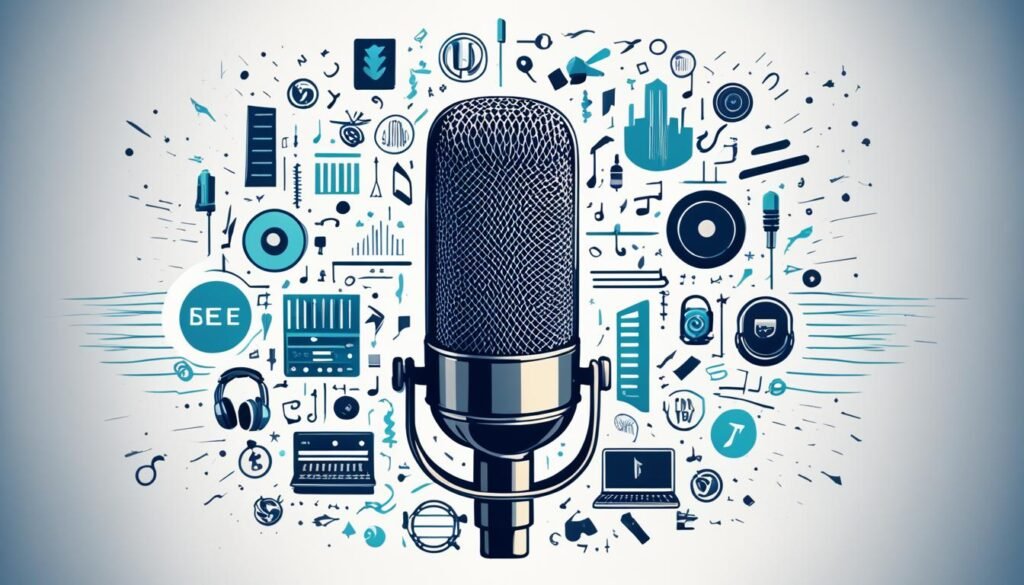
When it comes to pursuing a career in audio engineering, choosing the right university is crucial. The top-ranked audio engineering schools in the US offer comprehensive programs, experienced faculty, and state-of-the-art facilities that provide students with the knowledge and skills needed to excel in the industry. Here are some of the best universities for audio engineering:
| University | Location |
|---|---|
| Berklee College of Music | Boston, Massachusetts |
| Full Sail University | Winter Park, Florida |
| The Los Angeles Film School | Los Angeles, California |
| New York University – Steinhardt | New York City, New York |
| Georgia Institute of Technology | Atlanta, Georgia |
| Belmont University | Nashville, Tennessee |
| Carnegie Mellon University | Pittsburgh, Pennsylvania |
These universities offer a solid education and practical training in audio engineering. From the music mecca of Berklee College of Music in Boston to the vibrant film industry of Los Angeles Film School, each institution provides students with the resources and support necessary to succeed in their chosen career path. With experienced faculty and cutting-edge facilities, these top audio engineering schools ensure that students receive a comprehensive education that prepares them for successful careers in the industry.
Benefits of Attending Audio Engineering School
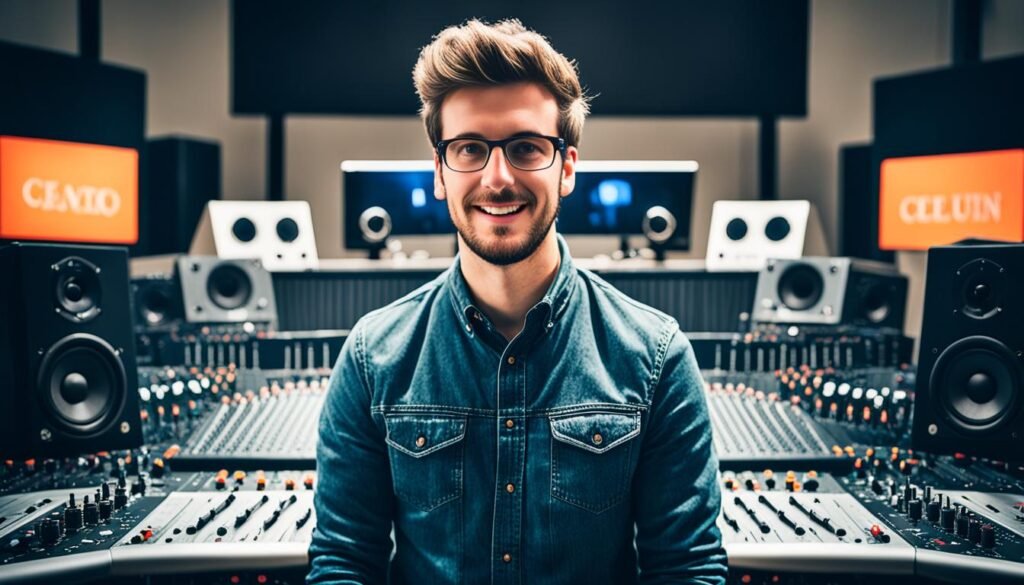
Attending audio engineering school offers several benefits for aspiring sound engineers. A formal education in audio engineering provides a comprehensive understanding of the field, including technical skills, industry knowledge, and hands-on experience. Sound engineering schools often have state-of-the-art facilities and access to industry-standard equipment and software, allowing students to gain practical experience in a professional setting. Networking opportunities with industry professionals and fellow students can also contribute to future career opportunities. Additionally, sound engineering degree programs can provide a competitive edge in the job market and lead to higher earning potential.
By attending audio engineering school, students can:
- Gain a comprehensive understanding of audio engineering principles and techniques
- Develop technical skills in recording, mixing, and mastering audio
- Access state-of-the-art facilities and industry-standard equipment and software
- Obtain hands-on experience in a professional audio engineering environment
- Network with industry professionals and fellow students for future career opportunities
- Enhance their job prospects and earning potential in the audio engineering industry
Attending audio engineering school can provide aspiring sound engineers with a solid foundation of knowledge and skills to succeed in their careers. From learning the technical aspects of audio production to gaining practical experience in professional environments, a formal education in audio engineering can open doors to various opportunities in the field.
Conclusion
Pursuing a career in audio engineering requires dedication, passion, and a strong foundation of knowledge and skills. By choosing the right audio engineering school, students can gain the education and practical experience needed to succeed in this dynamic and competitive industry. The top audio engineering schools in the US offer comprehensive programs, experienced faculty, and state-of-the-art facilities, providing students with the resources and support to achieve their career goals.
Whether it’s music production, film and television sound design, live sound reinforcement, or any other area of audio engineering, attending a reputable audio engineering school can set the foundation for a successful career. These schools offer specialized courses that cover a wide range of topics, from recording techniques to digital audio workstations, ensuring students develop a well-rounded skill set.
Moreover, the faculty at these top-ranked institutions are industry professionals with extensive experience, allowing students to learn from the best in the field. The state-of-the-art facilities and access to industry-standard equipment and software provide hands-on experience in a professional setting, preparing students for the realities of the audio engineering industry. With a sound education and practical training, graduates from these schools are well-equipped to pursue their dreams and thrive in the ever-evolving world of audio engineering.
Also Refer : Why Every School Needs A Vibrant Music Education Program
FAQs
Q: What are the best audio engineering courses and universities?
A: Some of the top schools for audio engineering and music school production include Berklee College of Music, Full Sail University, and SAE Institute.
Q: How can I become an audio engineer?
A: To become an audio engineer, you can pursue a degree program in audio engineering or music production and engineering at a reputable university or college.
Q: What can I expect from an audio engineering degree program?
A: An audio engineering degree program is designed to provide students with a strong foundation in sound production, music theory, and technical skills required to work in the music industry.
Q: What topics are covered in audio engineering and music production programs?
A: Courses in audio engineering and music production cover aspects such as sound recording, audio post-production, music technology, and music business.
Q: Are there online options available for studying audio engineering?
A: Yes, there are online audio engineering programs and diploma courses offered by various institutions for those who prefer distance learning or flexible study options.
Q: What are the career prospects for graduates with an audio engineering degree?
A: Graduates with an audio engineering degree can pursue careers as sound engineers, music producers, audio systems technicians, or work in areas related to sound production and technology.
Q: Which universities offer the best audio engineering and music production programs?
A: Some of the best colleges for audio engineering and music production include Berklee College of Music, Full Sail University, and New York University.
Source Links
- https://www.careersinmusic.com/audio-engineering-degree/
- https://www.careersinmusic.com/sound-engineering-courses/
- https://golocalise.com/blog/audio-engineering-schools-top-picks-2023




